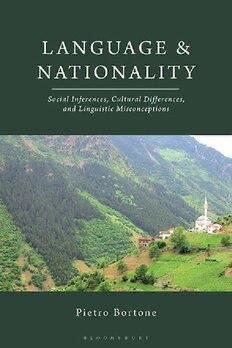Download Language and Nationality: Social inferences, cultural differences, and linguistic misconceptions PDF Free - Full Version
Download Language and Nationality: Social inferences, cultural differences, and linguistic misconceptions by Pietro Bortone in PDF format completely FREE. No registration required, no payment needed. Get instant access to this valuable resource on PDFdrive.to!
About Language and Nationality: Social inferences, cultural differences, and linguistic misconceptions
Language both reflects and reproduces social inclusions and exclusions; the language a person speaks, and the way that they speak it, signals membership of social groupings. But what role does language play in the formation and perpetuation of our ideas about ethnicity and nationality? Language and Nationality investigates this question and the pernicious consequences of the notion that ethnicity, nationality and language are naturally and exclusively connected.Beginning with an examination of how language helps to shape and influence a person’s sense of individual and collective identity, Pietro Bortone discusses the role that language has, or is believed to have, in the formation of ethnic and national communities. Showing how language, as both a channel for a national(ist) outlook and a national(ist) symbol in itself, came to be seen as the key indicator of both ethnicity and nationality, this book uncovers the far-reaching consequences the mistaken belief that a nation has a single, intrinsic language has had, and how the politicization of language can unite, but also dramatically divide, communities. Whilst language plays, and has always played, a major role in expressing and defining people’s identities, this book demonstrates that the idea that language, ethnicity and nationality are intrinsically linked is a misleading result of our intellectual history, and one which has had a significant cost.
Detailed Information
| Author: | Pietro Bortone |
|---|---|
| Publication Year: | 2021 |
| ISBN: | 9781350071667 |
| Pages: | 273 |
| Language: | |
| File Size: | 3.232 |
| Format: | |
| Price: | FREE |
Safe & Secure Download - No registration required
Why Choose PDFdrive for Your Free Language and Nationality: Social inferences, cultural differences, and linguistic misconceptions Download?
- 100% Free: No hidden fees or subscriptions required for one book every day.
- No Registration: Immediate access is available without creating accounts for one book every day.
- Safe and Secure: Clean downloads without malware or viruses
- Multiple Formats: PDF, MOBI, Mpub,... optimized for all devices
- Educational Resource: Supporting knowledge sharing and learning
Frequently Asked Questions
Is it really free to download Language and Nationality: Social inferences, cultural differences, and linguistic misconceptions PDF?
Yes, on https://PDFdrive.to you can download Language and Nationality: Social inferences, cultural differences, and linguistic misconceptions by Pietro Bortone completely free. We don't require any payment, subscription, or registration to access this PDF file. For 3 books every day.
How can I read Language and Nationality: Social inferences, cultural differences, and linguistic misconceptions on my mobile device?
After downloading Language and Nationality: Social inferences, cultural differences, and linguistic misconceptions PDF, you can open it with any PDF reader app on your phone or tablet. We recommend using Adobe Acrobat Reader, Apple Books, or Google Play Books for the best reading experience.
Is this the full version of Language and Nationality: Social inferences, cultural differences, and linguistic misconceptions?
Yes, this is the complete PDF version of Language and Nationality: Social inferences, cultural differences, and linguistic misconceptions by Pietro Bortone. You will be able to read the entire content as in the printed version without missing any pages.
Is it legal to download Language and Nationality: Social inferences, cultural differences, and linguistic misconceptions PDF for free?
https://PDFdrive.to provides links to free educational resources available online. We do not store any files on our servers. Please be aware of copyright laws in your country before downloading.
The materials shared are intended for research, educational, and personal use in accordance with fair use principles.

